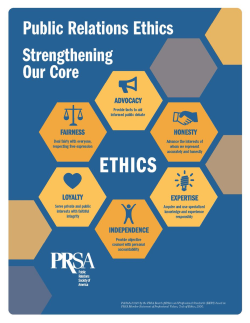 The PRSA Code of Ethics is a set of guidelines that helps public relations professionals “navigate ethical principles and applications and is widely regarded as the industry standard,” according to the PRSA student society.
The PRSA Code of Ethics is a set of guidelines that helps public relations professionals “navigate ethical principles and applications and is widely regarded as the industry standard,” according to the PRSA student society.
These principles include advocacy, honesty, expertise, independence, loyalty, and fairness. You can establish these principles throughout your organization, too, which will build a better relationship between you, your clientele, and your employees.
Advocacy
As journalists, marketers, and PR and communications employees, you have to advocate responsibly for those you represent. It is up to you to provide a voice to the public by spreading valuable information, viewpoints, facts, and ideas for the public to debate. This is a responsibility you take on as soon as you commit to a communications job and is something you should stand by as you advance in your career.
Honesty
As professionals whose job is to safeguard the image of a company or brand, it's hard to uphold the highest standards of accuracy and truth — especially when communicating with the public to advance the interests of those you represent. It's easy to tell half-truths or exaggerate small details, but according to the PRSA Code of Ethics, you must be fully truthful and accurate when presenting information to the public about the companies you represent.
Expertise
As PR and marketing professionals, you're not only held to the standard of informing the public honestly. You must also deliver your best work to your clientele and build relationships and credibility with other organizations and your audience. In other words, you should constantly acquire and use specialized knowledge and experience. To do so, you have to consistently develop your professionalism with the aid of research and education.
Independence
You are also held to the standard of giving unique and goal-based advice to those you represent. Not only that, but you are responsible for your actions, and you must take responsibility if anything goes wrong under your advice.
Loyalty
The Code of Ethics holds you to the principle of remaining faithful to your clients, while still properly advocating for the public interest.
Fairness
The last standard the Code of Ethics holds you to is to remain fair. You must respect the opinions of all and the right to freedom of expression. With that being said, you must deal fairly with clients, organizations, employees, peers, competitors, vendors, the media, and the public because all are a part of your work, one way or another.
To maintain healthy relationships with your employees, clientele, competitors, and the public, it is important to uphold these five standards from the PRSA’s Code of Ethics. It’s your job to help aid the public in making an informed decision, but it's also your job to do your best work for your client.
We can get so caught up in trying to do a good job for our clients that we forget about our responsibility to the public. Therefore, you should strive to use these standards in your professional fields and in your company or organization, and you should encourage your peers to do the same.
If you’ve made a mistake in following these guidelines and need help with your PR, you can download the 5 Mistakes Companies Make with Their PR (and How to Fix Them) guide here for advice.

Comment on This Article